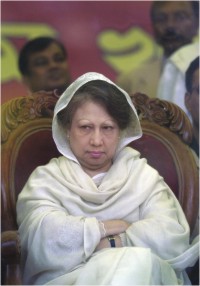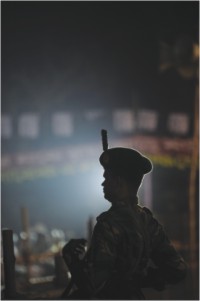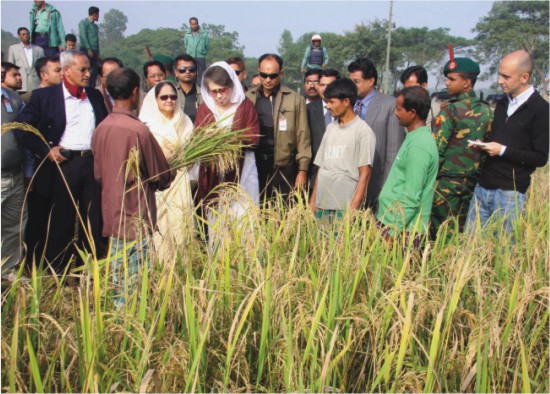
Inside
|
A Fortunate Khaleda Zia, Rumi Ahmed If the event of January 11, 2007 is the beginning of a popular reprisal against the pathetic record of Khaleda Zia's government of 2001 to 2006, the election of December 29, 2008 is climax of that reprisal of the people.
Mrs. Zia led her party to a substantial victory in the parliamentary election of 2001. Even during the election prior to that, in 1996, her party, although losing, won a substantial number of seats. The result of this election was worse than the wildest nightmare scenario BNP leaders ever could imagine of. Yes, BNP leaders including Khaleda Zia has complained of massive scale rigging. But there is definitely a consensus level acceptance of an Awami League victory, even within the BNP leadership. The margin of victory is so wide that that even if the alleged rigging were indeed true, a paradigm shift of the result is mathematically impossible. And this makes it a substantial victory for Awami League. A victory almost in par with its 1973 victory or much better than BNP's 2001 landslide victory. As this is the peak season of Monday morning quarterbacking with Bangladesh election politics, a plethora of advice and reasons for the election debacle are being thrown at Mrs. Zia almost non-stop. Not going into a repeat of those rhetorics, let's base this opinion piece on the positive side of this loss from Mrs. Zia's perspective. It is imperative to mention that every major election victory in Bangladesh ended in a bitter turn of fortune or tragedy. The 276 seat Awami League victory ended in the tragedy of August 15, 1975. President Zia's back-to-back victory in presidential and parliamentary election was followed by his assassination and near annihilation of his party. Ershad's forced victory of 1986 and 1988 followed the fall of this shameless dictator in 1990. BNP's 1991 victory was followed by its humiliating defeat to Awami League led street agitation and an election. Similarly, Awami League's crushing defeat to BNP in 2001 has just resulted in reversal of fortune in 2008. One will also notice that the more robust the initial victory was, the more devastating the reversal. Awami League's 1973 victory saw the tragedy of 1975. Not going into the reason of pre-75 problems, and not comparing anyone with Bangabandhu, we must agree that to some extent Awami League's rule between 1972 to 1975 was comparable in many aspects to the rule of BNP between 2001 and 2006.
There was widespread and deep-rooted public perception of rampant corruption, nepotism, and mal-governance. There were killings of elected lawmakers. During both the periods the most disaffected class were urban middle class, the media, and the civil and military bureaucracy. Observers saw similarity of Baksal-like autocratic system in BNP's attempts to cling to power by meddling with the caretaker government. When a civilian government loses its public endorsement, many quarters try to take the opportunity. Many a time we have seen a few members or resources of Bangladesh armed forces are being used to serve the interests of those quarters who take the opportunity of public rage against an unpopular government. In 1975, a few misguided officers, probably influenced by outside quarters, committed a massacre. Bangabandhu Sheikh Mujibur Rahman was killed along with almost all of the members of his extended family. All his sons, including minor Russel were also killed. His party almost vanished from the earth for at least next several years. Although, the party, with multiple factions started former politics within few years, it took them 21 years, a formal apology, and new generations who don't recall 1972-1975, to come back to power. During the aftermath of the August 1975 massacre, it was nearly impossible to find one person among urban educated class or the youth class who was sympathetic to Awami League. Awami League lost several consecutive generations. Khaleda Zia must be considered very fortunate compared to the fate Bangabandhu Mujib faced. Bangabandhu did not get the chance to defend himself or correct his lapses. Rather, he and his extended family were handed the ultimate punishment without any trial, nether in public verdict, nor in the judiciary. In contrast, Khaleda Zia, who faced an onslaught on January 11, 2007, could at least get the opportunity to see how people graded her work. She also got the opportunity to defend her governance and most importantly take lesson from her lapses and correct the mistakes she made. The same is very much true for her sons who also have the opportunity of defending the charges made against them and correct their actions. They must remember that Bangabandhu's sons were not given any chance to defend themselves against all the allegations against them.
It is true that most of what Khaleda Zia did since January 11, 2007 were the correct things to do. There is no doubt that people will remember her valiant and principled stand against the illegal moves made by the interim government. She single-handedly made the post 1/11 interim entity abort the Minus 2 formula and forced the withdrawal of the state of emergency. These definitely are the first steps in the process of her reincarnation. If Khaleda Zia can make her case to the public as well as the media, and if she decides to remain as principled as she has been during the last two years, it will only be a matter of time before she regains the youth and educated class she lost. Khaleda Zia must be very fortunate for the opportunity to learn from her own mistakes. She has all the tools and public support needed to veer back to the right path again. She must not let it down. At the same time, Bangladesh is also fortunate to see a democratic transition. Bangladesh has come a long way since 1975. In 1975, the founding leader of the country was killed along with all his family members. In 1981 the popular leader was killed. In 1982 another elected leader was forced out of power in gunpoint. Since the democracy revolution of 1990, 1975-1981-1982 style transition of power has become obsolete. What was a massacre in 1975, in 2008, it is a disguised civilian government forcing transition of power through an election. In Bangladesh, we definitely have come a long way. Rumi Ahmed is a political observer and writes for Drishtipat Writers' Collective. |


